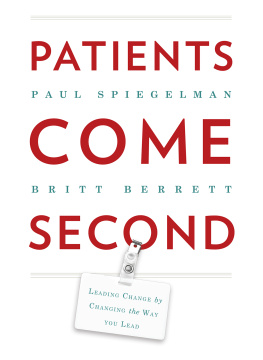T HE P ATIENT M ULTIPLEWyse Series in Social Anthropology
Editors:
James Laidlaw, William Wyse Professor of Social Anthropology, University of Cambridge, and Fellow of Kings College, Cambridge
Maryon McDonald, Fellow in Social Anthropology, Robinson College, University of Cambridge
Joel Robbins, Sigrid Rausing Professor of Social Anthropology, University of Cambridge, and Fellow of Trinity College, Cambridge
Social Anthropology is a vibrant discipline of relevance to many areas economics, politics, business, humanities, health and public policy. This series, published in association with the Cambridge William Wyse Chair in Social Anthropology, focuses on key interventions in Social Anthropology, based on innovative theory and research of relevance to contemporary social issues and debates. Former holders of the William Wyse Chair have included Meyer Fortes, Jack Goody, Ernest Gellner and Marilyn Strathern, all of whom have advanced the frontiers of the discipline. This series intends to develop and foster that tradition.
Volume 1
Sociality: New Directions
Edited by Nicholas J. Long and Henrietta L. Moore
Volume 2
The Social Life of Achievement
Edited by Nicholas J. Long and Henrietta L. Moore
Volume 3
The State Were In: Reflecting on Democracys Troubles
Edited by Joanna Cook, Nicholas J. Long and Henrietta L. Moore
Volume 4
The Patient Multiple: An Ethnography of Healthcare and Decision-Making in Bhutan
Jonathan Taee
T HE P ATIENT M ULTIPLE
An Ethnography of Healthcare and Decision-Making in Bhutan
Jonathan Taee
Published in 2017 by
Berghahn Books
www.berghahnbooks.com
2017 Jonathan Taee
All rights reserved. Except for the quotation of short passages
for the purposes of criticism and review, no part of this book
may be reproduced in any form or by any means, electronic or
mechanical, including photocopying, recording, or any information
storage and retrieval system now known or to be invented,
without written permission of the publisher.
Library of Congress Cataloging-in-Publication Data
Names: Taee, Jonathan, author.
Title: The patient multiple : an ethnography of healthcare and decision-making in Bhutan / Jonathan Taee.
Description: New York : Berghahn Books, 2017. | Series: WYSE series in social anthropology ; volume 4 | Includes bibliographical references and index.
Identifiers: LCCN 2016053205 (print) | LCCN 2016055843 (ebook) | ISBN 9781785333941 (hardback : alk. paper) | ISBN 9781785333958 (ebook)
Subjects: LCSH: Medical Anthropology--Bhutan. | Traditional medicine--Bhutan. | Traditional medicine--Technological innovation--Bhutan.
Classification: LCC GN296.5.B47 T34 2017 (print) | LCC GN296.5.B47 (ebook) | DDC 306.4/61095498--dc23
LC record available at hips://lccn.loc.gov/2016053205
British Library Cataloguing in Publication Data
A catalogue record for this book is available
from the British Library.
ISBN 978-1-78533-394-1 (hardback)
ISBN 978-1-78533-395-8 (ebook)
This book is dedicated to the patients
and healthcare practitioners of Bhutan.
May you long find hope and healing from one another.
Contents
Maps, Illustrations and Figures
Maps
0.1. Map of Bhutan: Cities, Towns and Roads
Illustrations
0.1. Young Woman Receives Treatment
1.1. Pema and a Drungtsho
2.1. Traditional-Medicine Patient Record
3.1. Traditional and Biomedical Integration
4.1. A Returner of Lost Souls
5.1. Blood Flows through Humans and Machines
Figures
An online collection of colour photography accompanying
this book is available at: www.jonathantaee.com
Acronyms
I have avoided using acronyms in the body of the text. Acronyms are used in parenthesised references and are spelled out in their full form on first appearance.
BBC | British Broadcasting Corporation |
BBS | Bhutan Broadcasting Service |
BHU | Basic Health Unit |
BST | Bhutan Stretchable Time |
DDC | Dzongkha Development Commission |
DRA | Drug Regulatory Authority, Royal Government of Bhutan |
DVED | Drug, Vaccines and Equipment Division, Royal Government of Bhutan |
FTM | Faculty of Traditional Medicine |
INR | International Normalised Ratio |
MLHR | Ministry of Labour and Human Resources, Royal Government of Bhutan |
MoAF | Ministry of Agriculture and Forests, Royal Government of Bhutan |
MoH | Ministry of Health, Royal Government of Bhutan |
MSP | Menjong Sorig Pharmaceuticals (Formally known as PRU) |
NSB | National Statistics Bureau, Royal Government of Bhutan |
NITM | National Institute of Traditional Medicine |
NTMH | National Traditional Medicine Hospital |
OCC | Office of the Census Commission, Royal Government of Bhutan |
PRU | Pharmaceutical Research Unit (Now called MSP) |
RGoB | Royal Government of Bhutan |
WHO | World Health Organisation |
Notes on Language, Transliteration, Transcription and Translation
Dzongkha (rdzong kha) is the national language of Bhutan, one of twenty-seven active languages. It is spoken by approximately 160,000 people, most of whom live in the western part of the country (Ethnologue, ISO 639-3, 2013). The second most common non-English language is Sharshop (shar phyogs pa), also known as Tshangla Lo (thangs la lo, Driem 1998: 2729), used primarily in the east of Bhutan; however, this particular language is further broken down into different dialects and subgroups (see Phuntsho 2013: 5162). My informants would often clump these eastern languages together using the umbrella term Sharshop, literally translated as [the language of the people of] the eastern direction. Dzongkha has roots in Classical Tibetan, known in Bhutan as Chke (chos skad). These languages share the same script, yet they are definitively different. George van Driem, one of the leading experts on Dzongkha and other Himalayan languages, notes, The relationship between Dzongkha and Chk in Bhutan is reminiscent of the role Latin used to play as the language of learning in Mediaeval France where the spoken language had long since evolved into a language different from that spoken by the ancient Romans (1991: 4).
The relationship between Dzongkha and modern Tibetan is complicated historically, linguistically and politically, yet a cursory introduction is necessary to present a sound methodology for handling Dzongkha in this book.









